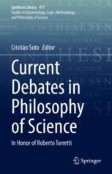Search
Search Results
-
Dissolving the Causal-Constitution Fallacy: Diachronic Constitution and the Metaphysics of Extended Cognition
This chapter questions the causal-constitution fallacy raised against the extended mind. It does so by presenting our signature temporal thesis about...
-
Why Diachronic Constitution Won’t Help. Commentary on “Dissolving the Causal-Constitution Fallacy”
In this short commentary, I will first show why Kiverstein & Kirchhoff's (this volume) analysis of the CC-fallacy is inadequate in an important way...
-
The Constitution-Turn and Extended Conscious Mind
This chapter analyses the lively, ongoing debate at the intersection of philosophy of mind and philosophy of science about the causal–constitution...
-
Commentary on “Extended Cognition and the Search for the Mark of Constitution – A Promising Strategy?”
The discussion of extended cognition is premised on a metaphysical distinction between causation and constitution. For example, Rowlands (2009) notes...
-
Physicalism, Infinite Decomposition, and Constitution
How could physicalism be true of a world in which there are no fundamental physical phenomena? A familiar answer, due to Barbara Gail Montero and...
-
The Story of ‘I’: Comments on Rudder Baker’s Constitution View of Persons
In this chapter, I discuss Lynne Rudder Baker’s Constitution View of persons that she presented in her book, Persons and Bodies: A Constitution View....
-
Appearance and Persistence as the Unity of Diachronic and Synchronic Concepts of Emergence
Recent philosophical discourse on emergence has developed with particular concern for the distinction between weak and strong emergence (e.g., Bedau
1997... -
From complexity to systems
The interrelation between two theories, theory of complexity and theory of systems, is analyzed by using the chemical graph-theoretical concept. The...

-
Categories of Complexity
The problem of complexityComplexity is discussed in the frame of the new principle of systematization on the three categories: synchronic...
-
‘Today a Christian Nation, Tomorrow a Muslim Nation’: a Defence of Rotating State Religions
In more than 20% of countries, a single religion is recognized in the constitution. This article argues that there are good reasons for opposing such...
-
Processes as variable embodiments
In a number of papers, Kit Fine introduced a theory of embodiment which distinguishes between rigid and variable embodiments, and has been...

-
Situated Cognition Research Methodological Foundations
This volume assembles supporters and critics of situated cognition research to evaluate the intricacies, prerequisites, possibilities, and scope of a...
-
Teleosemantics
In this chapter, I argue that representational contents based on teleosemantics cannot be explanatorily relevant in constitutive mechanistic...
-
Identity and Food Choice: You Are What You Eat?
We use Marya Schechtman’s Narrative Self-Constitution View to support the widespread idea that food can contribute to the construction and expression...
-
A Kantian-Rooted Pluralist Realism for Science
After the preeminence of logical positivism/empiricism during the most part of twentieth century, during the last decades many authors began to...
-
Time-Consciousness and Affective Identity
This chapter combines the problems of the affective unconscious and affective identity with the minimal self, more precisely, with the notion of the...
-
Molinism in Renaissance Philosophy
Molinism is a theological and philosophical theory developed during the late sixteenth century by Luis de Molina. In particular, Molinism tries to...
-
The Narrative Self and the Minimal Self
The aim of the chapter is to provide a detailed introduction to the multidimensional analysis of the self. The chapter examines the contrast between...
-
Pre-Reflective Self-Consciousness: A Meta-Causal Approach
I present considerations surrounding pre-reflective self-consciousness (PRSC), arising in work I am conducting on a new physicalist, process-based...
-
Aging, Equality and the Human Healthspan
John Davis ( New Methuselahs : The Ethics of Life Extension , The MIT Press, Cambridge, 2018) advances a novel ethical analysis of longevity science...
